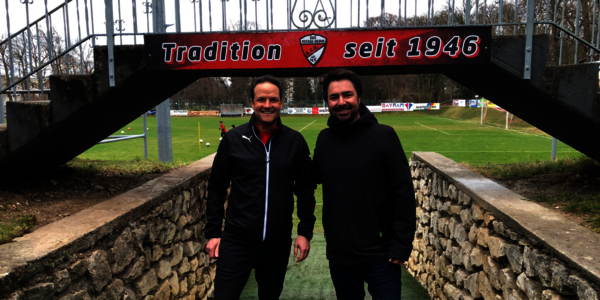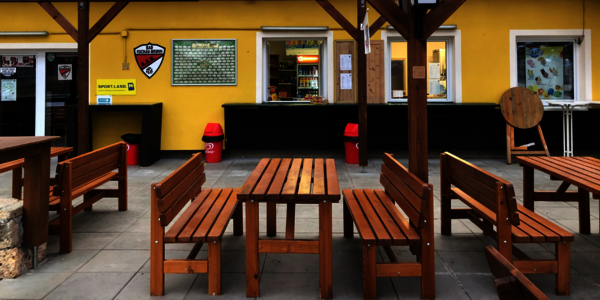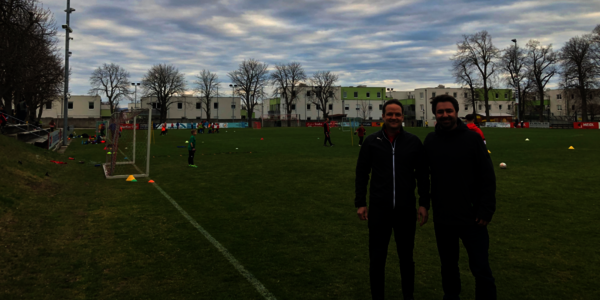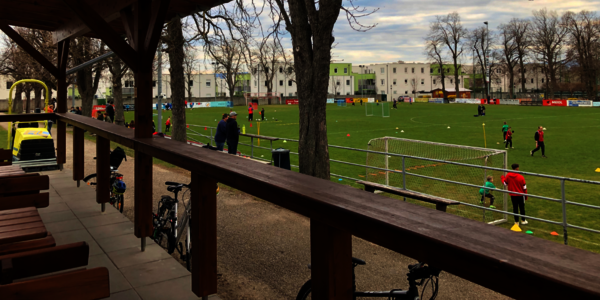Portrait series: Clear the stage for diverse & inclusive associations! #3
It is a balmy afternoon in March when life returns to the sports field of ASK Bad Fischau-Brunn. Although the big footballers of the fighting teams are still in their winter break, the little kickers are swarming all the more. It's a bit like ASK has organised a football camp for the youngsters, with football-mad kids running after the ball here, there and over there. At the edge of the sports fields there is a nice little clubhouse with a large terrace, refreshments are available at the drinks stand, and next to it parents watch their youngsters letting off steam. The Lower Austrian municipality of Bad Fischau-Brunn with about 2200 inhabitants offers the typical sports field flair of a village club that can be found many times over in Austria. If it weren't for a few active people in the background who make the club something special. A club that leads the way as a socially committed role model and is part of one of the largest youth departments in Austria.
Youth leader Markus Hofer and chairman Andreas Kerschbaumer sit at one of the wooden tables on the terrace of the clubhouse and enjoy the hustle and bustle on the sports field. "It's really cool," says Kerschbaumer, referring to the many kids playing football on the sports fields. The 40-year-old has been chairman of ASK since 2018 and grew up at the sports field. His father was a section leader, his mother a treasurer, his uncle a chairman. After primary school, he went to do his homework with his grandma and grandpa, who lived in the clubhouse and were also the caretaker and groundsman. Then it was off to the lawn. "When I was 13 or 14 and the club was down financially, I said to my mum: 'Don't worry, one day I'll take over the club and bring it back to the top,'" says Kerschbaumer. Today the men's team is still in the fifth-class Gebietsliga Süd/Südost and not in the 2nd Landesliga Ost as it was until 1996, but the club shines with its youth work.
Around 370 kids and 60 coaches, including two all-girls teams, belong to what the club describes as "Austria's largest youth football project". Of course, ASK can't do it all on its own. That is why the club initiated a joint venture with four other clubs in 2017: SV Winzendorf-Muthmannsdorf, SV Weikersdorf, FC St. Egyden and SV Willendorf. "Every child should be able to play football regardless of talent," says Kerschbaumer. It then takes at least two or more teams in the year group to promote the children according to their performance level. Otherwise they lose interest or look for another club." Thanks to sponsors and the municipality, it was possible to offer one hour of care for one euro. "That doesn't happen anywhere else," says Kerschbaumer. "If you play tennis, you pay 25 euros an hour. This is one of the reasons why children from surrounding villages come to Bad Fischau-Brunn to play football.
At some point, the youth team is supposed to benefit from the youth work. At the time the youth project was started, only about four percent of the men's team started at one of the regular clubs. In the future, it should be at least 15-20 per cent, in order to increase the identification with the club and also the interest in the village. The first results will be seen in four years' time, when the first cohort of youngsters will move on to adult football. However, the club is not primarily concerned with sporting success. "It's no use if we come first and nobody cares," says Kerschbaumer. "I'd rather come eighth and a lot of people care." The focus, he says, is on the kids, who should have a good time and "make friends regardless of class".
Social commitment is also important to the club. The ASK regularly supports social projects. In recent years, for example, it has collected money for children suffering from "moonlight sickness", the "Kinderzukunft" association, the parents' association of the Wiener Neustadt forest school or Ukrainian refugees, and helps with an annual waste collection campaign in the community. "If you have enough yourself, you can think outside the box," says youth leader Hofer. "We try to participate in such campaigns at least once a year. After all, you want to give something back."
"Football is the greatest integration tool Austria has".
The Lower Austrian football club ASK Bad Fischau-Brunn is not only part of one of the largest youth football projects in Austria, but also very committed to social issues. In an interview, chairman Andreas Kerschbaumer talks about the motivation behind the commitment and the social task the club wants to fulfil.
fairplay: Mr. Kerschbaumer, in addition to other fundraising campaigns, you have collected 30,000 euros for children suffering from "moonshine disease" and regularly participate in the fairplay action weeks. What is the motivation behind this?
Andreas Kerschbaumer: The social mission is the reason why you volunteer at a football club. What do you spend your free time on if not on general social commitment, that people meet, communicate, that sport takes place, exchange between generations, between social classes. Football is the greatest integration tool Austria has. It doesn't matter whether it's for someone moving from Vienna to the countryside, for the socially disadvantaged, for other religions or cultures. That is our contribution.
Who are the driving forces behind the commitment?
When our core team took over the club ten years ago, we chose an orientation that included sport on the one hand and the social environment on the other. It was clear from the beginning that we don't just want to be a sports club, but also want to help in the community with events, support and solidarity projects. That comes from the people involved, such as our youth leader Markus Hofer, for whom this is a personal concern. As chairman, I do the same. Ukrainians have lived with me at home since the beginning of the war. We don't look for aid projects. But if it suits us and we are behind it, we are happy to support it.
Every year you also participate in the Bad Fischau-Brunn municipality's field cleaning campaign.
Exactly. It's a give and take. We want the municipality to support us with subsidies. At the same time, we want spectators to come to us and also consume. On the other hand, we can give something back by picking up a bit of rubbish once a year and the children realise that plastic is not so bad when you throw it out of your car while driving. The kids then also see the mountains of rubbish that people leave behind.
There is a lot of effort involved in such actions that other sports clubs don't make. Can you personally get something out of it?
You can be proud. It's easy to forget what you're doing for society. But every now and then you remember that it's a good story. If you stop for a moment and look at the children, it's really cool. We have already had tennis player Dominik Thiem and the Allstars from Austria Wien as guests at our sports field as part of the Make-A-Wish Foundation. When hundreds of people come, it's good for the ego. Even if that's not why you do it, of course.
Are these projects and actions what you want to stand for as an association?
We are not an aid organisation, but still a football club that wants to create a social meeting place for children and adults. We also try to be a non-political club. However, the fair play slogan "Football without exclusion" reflects exactly what we have set out to do. We want to offer every child the opportunity to play football. No matter what ethnic or religious background, no matter what social class and no matter how talented a child is. In football, the fact that you wear the same jersey unites you.






